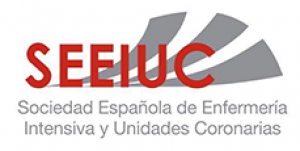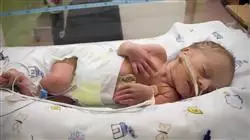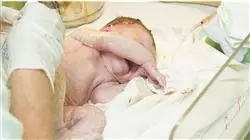University certificate
Scientific endorser

The world's largest faculty of nursing”
Introduction to the Program
With the Postgraduate diploma in Neonatal Pharmacology for Nursing you have the opportunity to update your knowledge in a practical way and without sacrificing scientific accuracy, in order to incorporate the latest advances in nursing care of newborns in the Neonatal Intensive Care Unit"

Neonatology is a discipline in constant progress, which is highly dependent on technology and new pharmacological treatments. This context makes the updating of care procedures in the neonatal intensive care unit of utmost importance in order to maintain care based on the latest scientific evidence and to ensure the safety of the baby.
This program includes the most relevant topics about the admission of the newborn in neonatology or NICU, knowledge and management in drug administration, principles of drug administration, vascular access in neonatology and pain control and sedation in the newborn. In addition, it places special emphasis on the implementation of measures to improve patient safety in the neonatal unit, providing relevant knowledge about drugs in terms of indications, dosage, preparation, monitoring, side effects and incompatibilities.
The Postgraduate diploma in Neonatal Pharmacology for Nursing allows, in a practical way, to achieve this update of the most used procedures to contribute with quality and safety to the recovery of neonates, improve their prognosis and avoid the sequelae of severe pathology.
In addition, it will facilitate the incorporation to the labor market in this field, due to the need for nursing professionals trained in the care of the critical newborn in neonatal intensive care units.
Improve the care of your newborn patients with the specialization offered by the Postgraduate diploma in Neonatal Pharmacology for Nursing"
This Postgraduate diploma in Neonatal Pharmacology for Nursing contains the most complete and up-to-date scientific program on the market. The most important features include:
- Clinical cases presented by experts in the different specialties. The graphic, schematic, and practical contents with which they are created provide scientific and practical information on the disciplines that are essential for professional practice
- New active ingredients and their administration to the newborn patient in neonatal intensive care units
- Presentation of practical workshops on procedures, nursing care and medication administration techniques
- An algorithm-based interactive learning system for decision-making in the clinical situations presented throughout the course
- Practical guides on different pathologies. These guides follow the scientific and pedagogical criteria of the main scientific reference
- All of this will be complemented by theoretical lessons, questions to the expert, debate forums on controversial topics, and individual reflection assignments
- Content that is accessible from any fixed or portable device with an Internet connection
This Postgraduate diploma is the best investment you can make when selecting a refresher program, for two reasons: in addition to updating your knowledge in neonatal pharmacology, you will obtain a qualification from TECH Global University"
Its teaching staff includes, renowned specialists in the field of neonatology, who bring the experience of their work in the country’s leading medical centres to this program.
Thanks to its multimedia content developed with the latest educational technology, they will allow the professional a situated and contextual learning, that is to say, a simulated environment that will provide an immersive learning programmed to train in real situations.
This program is designed around Problem-Based Learning, whereby the nursing professional must try to solve the different professional practice situations that arise throughout the educational program. In order to do this, the nursing professional will be assisted by an innovative interactive video system, created by renowned and experienced experts in treating critical neonatal patients and with extensive teaching experience.
Increase your professional opportunities by studying the Postgraduate diploma in Neonatal Pharmacology for Nursing"

It includes real clinical cases to bring the development of the program as close as possible to everyday practice"
Why study at TECH?
TECH is the world’s largest online university. With an impressive catalog of more than 14,000 university programs available in 11 languages, it is positioned as a leader in employability, with a 99% job placement rate. In addition, it relies on an enormous faculty of more than 6,000 professors of the highest international renown.

Study at the world's largest online university and guarantee your professional success. The future starts at TECH”
The world’s best online university according to FORBES
The prestigious Forbes magazine, specialized in business and finance, has highlighted TECH as “the world's best online university” This is what they have recently stated in an article in their digital edition in which they echo the success story of this institution, “thanks to the academic offer it provides, the selection of its teaching staff, and an innovative learning method aimed at educating the professionals of the future”
A revolutionary study method, a cutting-edge faculty and a practical focus: the key to TECH's success.
The most complete study plans on the university scene
TECH offers the most complete study plans on the university scene, with syllabuses that cover fundamental concepts and, at the same time, the main scientific advances in their specific scientific areas. In addition, these programs are continuously being updated to guarantee students the academic vanguard and the most in-demand professional skills. In this way, the university's qualifications provide its graduates with a significant advantage to propel their careers to success.
TECH offers the most comprehensive and intensive study plans on the current university scene.
A world-class teaching staff
TECH's teaching staff is made up of more than 6,000 professors with the highest international recognition. Professors, researchers and top executives of multinational companies, including Isaiah Covington, performance coach of the Boston Celtics; Magda Romanska, principal investigator at Harvard MetaLAB; Ignacio Wistumba, chairman of the department of translational molecular pathology at MD Anderson Cancer Center; and D.W. Pine, creative director of TIME magazine, among others.
Internationally renowned experts, specialized in different branches of Health, Technology, Communication and Business, form part of the TECH faculty.
A unique learning method
TECH is the first university to use Relearning in all its programs. It is the best online learning methodology, accredited with international teaching quality certifications, provided by prestigious educational agencies. In addition, this disruptive educational model is complemented with the “Case Method”, thereby setting up a unique online teaching strategy. Innovative teaching resources are also implemented, including detailed videos, infographics and interactive summaries.
TECH combines Relearning and the Case Method in all its university programs to guarantee excellent theoretical and practical learning, studying whenever and wherever you want.
The world's largest online university
TECH is the world’s largest online university. We are the largest educational institution, with the best and widest online educational catalog, one hundred percent online and covering the vast majority of areas of knowledge. We offer a large selection of our own degrees and accredited online undergraduate and postgraduate degrees. In total, more than 14,000 university degrees, in eleven different languages, make us the largest educational largest in the world.
TECH has the world's most extensive catalog of academic and official programs, available in more than 11 languages.
Google Premier Partner
The American technology giant has awarded TECH the Google Google Premier Partner badge. This award, which is only available to 3% of the world's companies, highlights the efficient, flexible and tailored experience that this university provides to students. The recognition as a Google Premier Partner not only accredits the maximum rigor, performance and investment in TECH's digital infrastructures, but also places this university as one of the world's leading technology companies.
Google has positioned TECH in the top 3% of the world's most important technology companies by awarding it its Google Premier Partner badge.
The official online university of the NBA
TECH is the official online university of the NBA. Thanks to our agreement with the biggest league in basketball, we offer our students exclusive university programs, as well as a wide variety of educational resources focused on the business of the league and other areas of the sports industry. Each program is made up of a uniquely designed syllabus and features exceptional guest hosts: professionals with a distinguished sports background who will offer their expertise on the most relevant topics.
TECH has been selected by the NBA, the world's top basketball league, as its official online university.
The top-rated university by its students
Students have positioned TECH as the world's top-rated university on the main review websites, with a highest rating of 4.9 out of 5, obtained from more than 1,000 reviews. These results consolidate TECH as the benchmark university institution at an international level, reflecting the excellence and positive impact of its educational model.” reflecting the excellence and positive impact of its educational model.”
TECH is the world’s top-rated university by its students.
Leaders in employability
TECH has managed to become the leading university in employability. 99% of its students obtain jobs in the academic field they have studied, within one year of completing any of the university's programs. A similar number achieve immediate career enhancement. All this thanks to a study methodology that bases its effectiveness on the acquisition of practical skills, which are absolutely necessary for professional development.
99% of TECH graduates find a job within a year of completing their studies.
Postgraduate Diploma in Neonatal Pharmacology for Nurses
The Postgraduate Diploma in Neonatal Pharmacology for Nurses is a training program designed to provide nursing professionals with the knowledge necessary to provide quality and safe care for newborns and neonates in need of pharmacological treatment. The birth of a baby is one of the most important moments in a family's life and requires careful and specialized care to ensure the baby's well-being. In some situations, the use of medications is necessary to treat neonates. Neonatal pharmacology is a medical specialty that focuses on the use of medications in newborns and how these medications can affect their development and growth. This online program from TECH Global University will provide nursing professionals with the knowledge necessary to safely and effectively administer medications to newborns and neonates. Students will learn about proper dosing for neonates, side effects and how to manage them, and how to identify and prevent drug interactions.
Specialize in neonatal pharmacology
The program will address topics such as pharmacokinetics and pharmacodynamics in the neonatal population, drug selection and use in neonatology, common side effects in neonates, and safe drug administration. Specific topics such as drug therapy in prematurity and parenteral nutrition will also be covered. Students will have the opportunity to learn interactively and collaboratively with other nursing professionals. The program is taught in flexible virtual classes and using innovative methodologies that will help you apply the knowledge acquired and improve your skills in the administration of medications in neonatology. In summary, this postgraduate program is a unique opportunity for nursing professionals who wish to specialize in the care of newborns and neonates who require pharmacological treatment. With the knowledge acquired, students will be able to provide safe, quality care to neonates and improve the quality of life for families.







